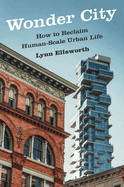
Amid the real-estate development battle between advocates of "hyper-dense" urban living with ever-taller towers at the center, and those who instead push for a return to human-scale city life, Wonder City is a call to action in which Lynn Ellsworth deftly argues in favor of the latter. This rigorously researched but approachable volume navigates architectural philosophy, legal precedent, and historical building patterns. Urban activist and economist Ellsworth's organized approach aims to bring more people to this conversation--not just those who might already be involved on various sides of the fight--and she makes the stakes of losing the "wonder city" clear not only for New York City but for urban development everywhere.
Ellsworth disentangles talking points from the reality of their ineffectiveness when put into practice, placing facts in the face of what many Americans are feeling: that affordability and quality of life worsen in urban centers as more towers go up, and public space, access to sunlight, and amenities dwindle with increases in private development. Ellsworth proposes a commitment to reinvesting in the "public realm" and to fortifying the ideal of the lost "commons"--areas and points of public use, utility, and rights that the assault of modernist architecture has been chipping away at for decades. Her thorough fact- and history-based approach, which is rooted in the lived contexts of cities and underscored by her personal experience as someone who knows what is being lost as the human-scale New York City disappears, presents a compelling argument for readers interested in the future of urban development, as well as anyone who has ever been enchanted by the Big Apple. --Michelle Anya Anjirbag, freelance reviewer

